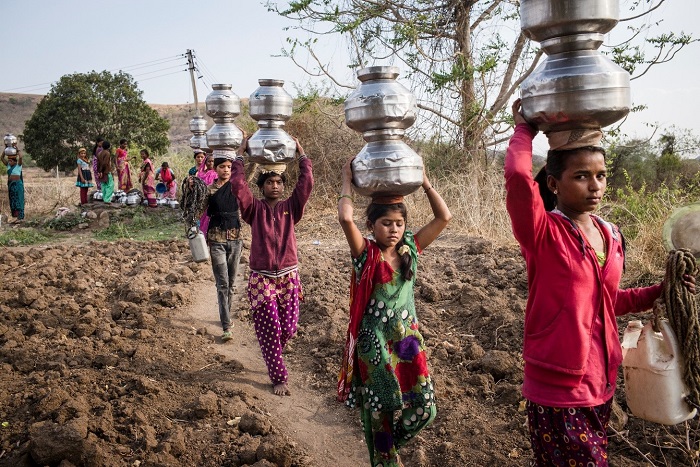Gender equality today for a sustainable tomorrow
The International Women’s Day 2022 theme of ‘Gender equality today for a sustainable tomorrow’ underscores the contribution of women and girls on climate change adaptation, mitigation and response at every level in every country to build a more sustainable future.
Climate change has severe and lasting effects on the environment and socio- economic development. Vulnerable and marginalised populations are often the most dependent on natural resources and experience the deepest impacts of shifts in temperatures and weather patterns, rising pollution, and increasing scarcity of natural resources.

Women and girls often bear the deepest impacts of increasing scarcity of natural resources, such as water © Florian Lang/WHO SEARO
Women and girls have been powerful drivers of change for climate adaptation and risk mitigation in their homes, communities and at the policy level. Their participation and leadership in sustainability initiatives have led to inclusive and effective climate action across the world, including in India
Women participation in the Government of India’s flagship programmes is revolutionalising social change in rural India. Millions of women have switched to using LPG gas distributed under the Pradhan Mantri Ujjwala Yojana to lower their dependence on polluting fossil fuels for cooking; ‘Rani Mistris’ (skilled women masons) have breached the traditional male bastion to construct millions of toilets in rural India; even as women across the country are mobilising communities to rationally use tap water provided under the Har Ghar Jal programme for sanitation and water conservation.
Women participation in the workforce and decision-making leads to diverse, equitable, and inclusive action across sectors – whether it is in government, the boardroom or in the community. This drives social and political action for sustainable development and greater gender equality.
“While gender stereotypes are being challenged in every sector, there is continuing need for more inclusive behaviours. We must continue to strive for diversity, equity and inclusion in every action we take to end conscious and unconscious bias that significantly impacts equity and opportunities for women. We must take action for equality and #BreakTheBias,” said Dr Roderico H. Ofrin, WHO Representative to India.
The theme for International Women’s Day is aligned with the priority theme for the upcoming 66th Commission on the Status of Women (CSW66): “Achieving gender equality and the empowerment of all women and girls in the context of climate change, environmental and disaster risk reduction policies and programmes”.
International Women's Day reinforces the role of each of us in forging a more equitable and gender-balanced world that is free of bias, stereotypes and discrimination. This is crucial to address the climate crisis and disaster risk reduction for a sustainable future.
Gender balance and parity is not just about women’s rights, it’s about human rights. Each one of us, irrespective of gender, must advocate for inclusive mindsets and tangible action for a sustainable future with the active participation of women and girls.
